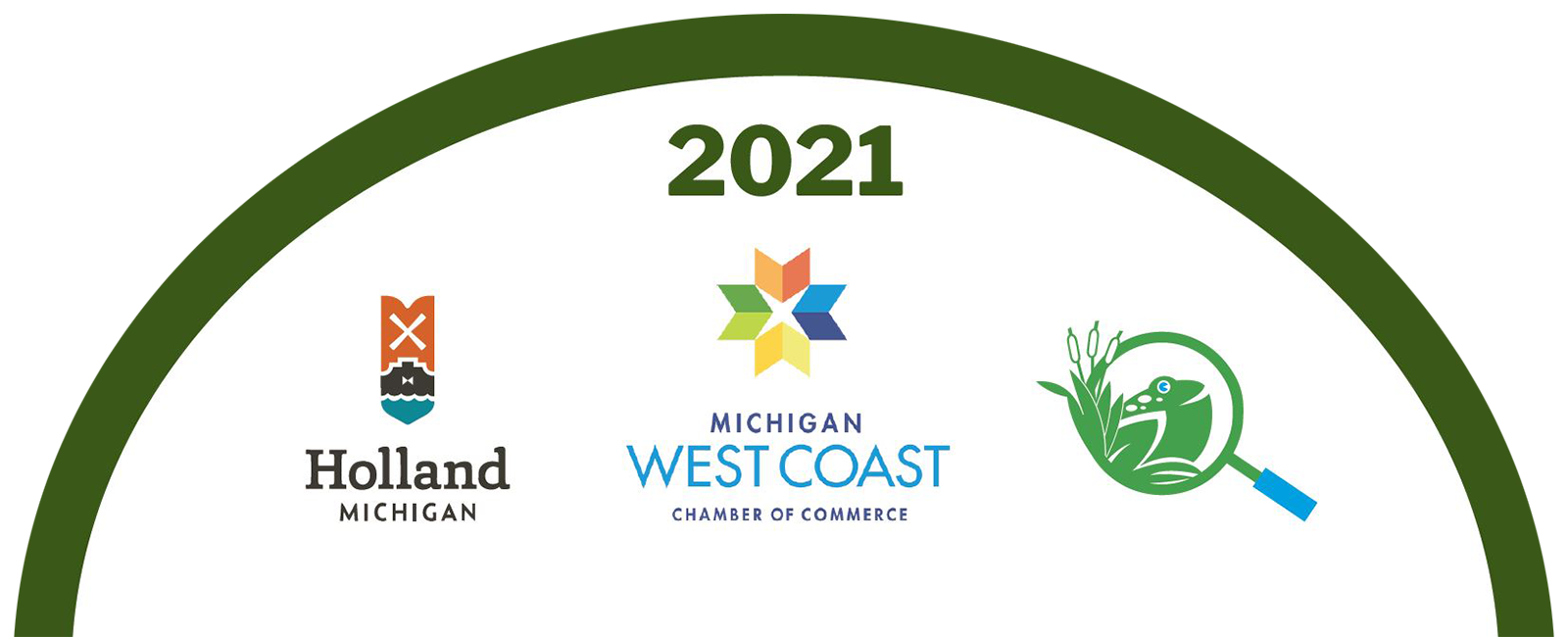
Nature-rich businesses support sustainability, resiliency, and livability. Together they help make our lakeshore communities the best place to live, work, learn, and play. Recognition in this publication is not a certification or ranking, but an acknowledgement of positive action and sustainable improvements.
2021 nominees were identified through community outreach by this year’s supporting partners for their commitments to the various pillars of the City of Holland Sustainability Framework (click the icons next to each business for more information). Know of a business that should be featured in the next edition of the Nature-rich Business Guide? Tell us about it here!
Dear Community Members,
With a common interest in making our lakeshore communities the best place to live, work, learn, and play our organizations are pleased to launch the first issue of the Nature-rich Business Spotlight. It is our hope that this resource will inform sustainably-minded shoppers, recognize businesses and organizations doing their part, and encourage others to take action. We are proud of our Nature-rich community and encourage you to engage with these businesses in their efforts to become more sustainable.
Keith Van Beek, City Manager, City of Holland
Jane Clark, President & CEO, West Coast Chamber of Commerce
Travis Williams, CEO, ODC Network
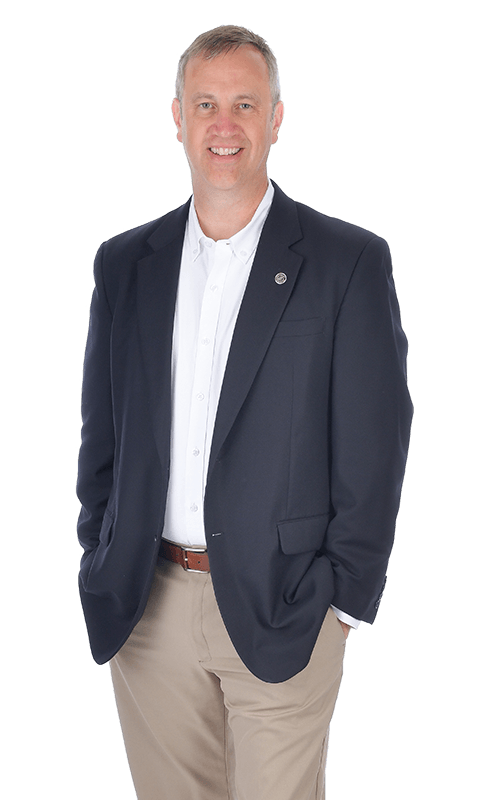

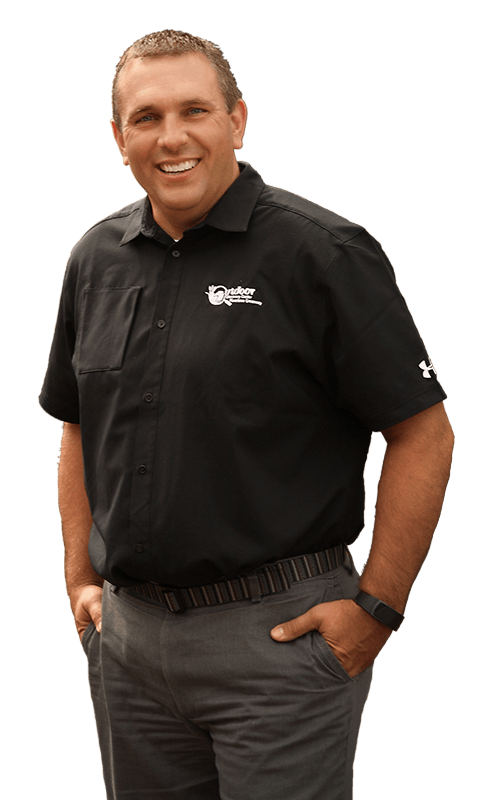
Lemonjello’s opened in 2003 and has been continuously working to become closer to zero waste ever since. They began by piloting a mixed recycling program for downtown that year and eventually also piloted a commercial compost program several years later.
Beyond that, Lemonjello’s has always sought out other ways to have a positive environmental impact. Saving up scrap metal and utilizing Padnos, paying attention to water and electric use, buying energy star equipment when possible, looking for organizations that recycle or reuse things that can’t go into the common-stream, finding ways to reuse or repurpose, building relationships with more local vendors and ordering in bulk to cut down on shipping, seeking out compostable paper goods, switching to compostable cups and wares and when PLA options started appearing, supporting other businesses with a similar mindset, and the owner (Matt) giving talks at coffee events to help other coffee companies learn how they can get closer to zero waste themselves. You’ll notice there are no trash cans in the dining room, so staff can sort waste appropriately, and we’ll bet it’ll always be that way at Lemonjello’s.
Tripelroot is a brewery, deli & market located in downtown Zeeland, Michigan. We have been serving the community since 2014.
We operate on the philosophy of: simple. social. sustainable. From the beers we brew to the handcrafted food in our taproom, to the local events that we participate in, we are striving to create a long term asset for our community to enjoy. Many people enjoy gathering in our rustic, comfortable atmosphere. We host trivia every Tuesday & feature local musicians every Friday night.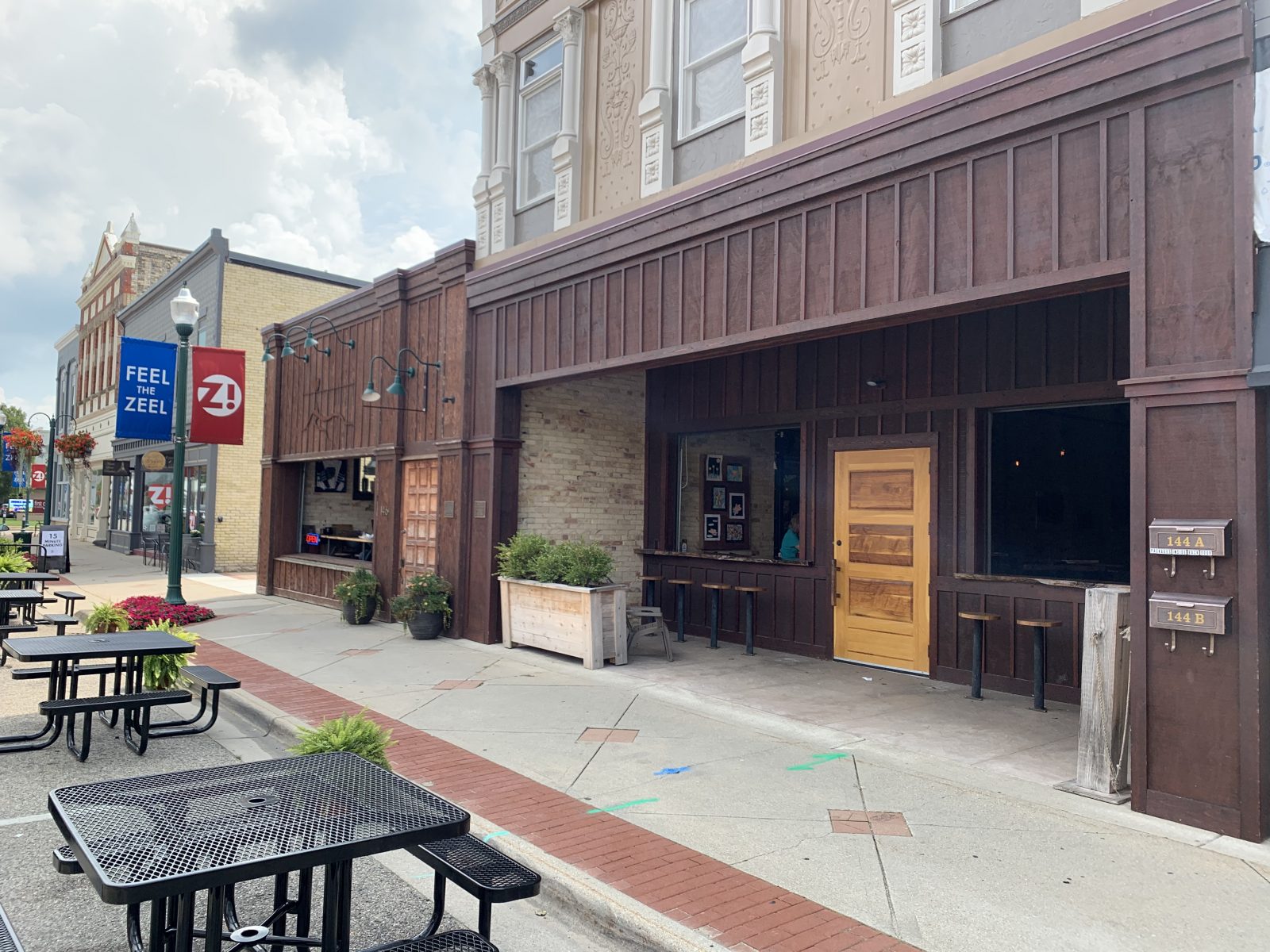
We do our best to take care of our planet by giving our spent grains to a few local farmers to feed to their cattle and hogs. We recycle and participate in a commercial composting program. Even before we opened, we took care to select a historic building to renovate into our space, and we repurposed materials from local barns, including barn beams, barn siding, & metal roofing. We purchase from local farmers and suppliers for our kitchen and stock locally made items in our market.

Most people probably think about energy efficiency, recycling, and composting when it comes to sustainability. But investments can also be sustainable. You may be wondering how you can choose companies to invest in that are focused on sustainability. There are several important factors to consider. Of importance are profit margins, growth trends, and the stewardship of management. Focusing on energy and resource efficiency allows companies to produce higher profit margins. With higher margins, management can reinvest in the company’s growth and potentially reward investors with by increasing dividends. Stewardship of management is another important aspect. If management is a good steward to their stakeholders, employees will be happier. This will result in higher productivity and lower operating costs.
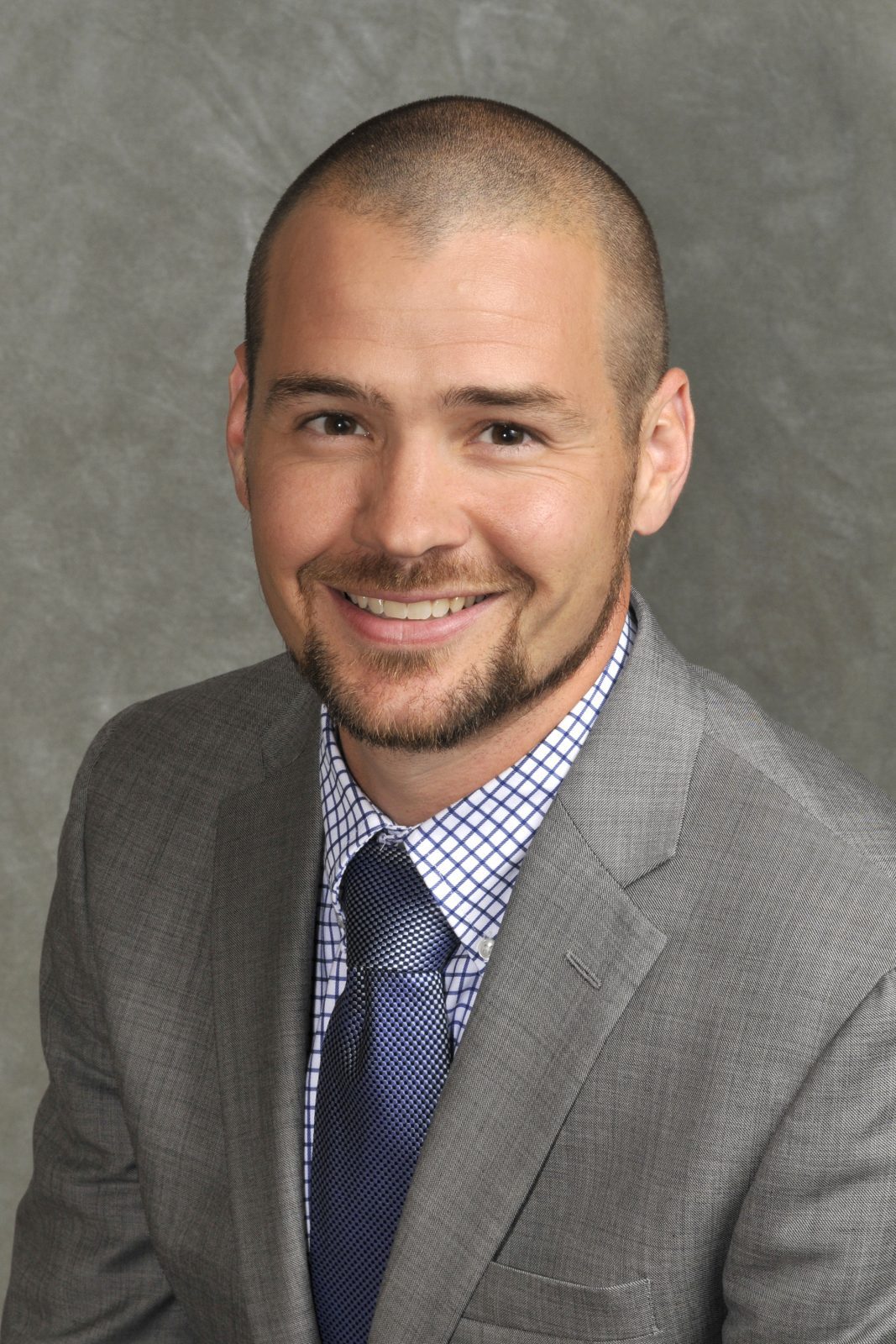 At my office, we work with clients to select investments which align with their values and their goals. This allows clients to feel good about which companies they are supporting. Though we vote for our elected representatives every 2, 4 or 6 years, we vote with our dollars every day. Let’s make those votes count. We do our part at our office by focusing on recycling, conserving energy and forgoing single-use plastic. It’s the little things which add up to big changes.
At my office, we work with clients to select investments which align with their values and their goals. This allows clients to feel good about which companies they are supporting. Though we vote for our elected representatives every 2, 4 or 6 years, we vote with our dollars every day. Let’s make those votes count. We do our part at our office by focusing on recycling, conserving energy and forgoing single-use plastic. It’s the little things which add up to big changes.
Today, with the abundance of inexpensive materials available to mass produce tableware, handcrafted wooden bowls have become a speciality item. The Holland Bowl Mill prides itself not only in the quality of its bowls, but the fact that they are American-made crafted from Cherry, Walnut, Beech, Hard Maple and Red Oak, using timber harvested from forests throughout Michigan, Indiana and Ohio. Being environmentally-friendly is an ongoing component of our business and is considered in all decisions in the production of wood products. Only the larger diameter trees are harvested, leaving smaller, less mature trees to grow in their place. By removing the huge canopies of leaves, more sunlight penetrates the forest floor where young foliage can prosper. The logs are delivered to our mill and cut into bowl blanks. Four bowls can be made from each blank by nesting descending sizes together. Any of the wood that cannot be used to produce bowls is completely utilized so nothing goes to waste or is put into a landfill. The remaining wood is recycled as firewood for homes or campfires and the shavings and fine turnings are used for animal bedding. 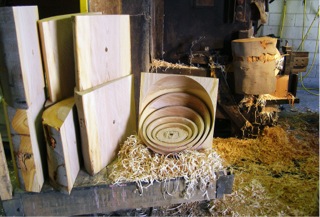 The natural properties in wood, as a natural, sustainable, renewable and recyclable resource, make it a logical environmental choice. We offer a lifetime guarantee for all of our bowls and pride ourselves in the fact that at the Holland Bowl Mill we are manufacturing tomorrow’s antiques that will last for generations.
The natural properties in wood, as a natural, sustainable, renewable and recyclable resource, make it a logical environmental choice. We offer a lifetime guarantee for all of our bowls and pride ourselves in the fact that at the Holland Bowl Mill we are manufacturing tomorrow’s antiques that will last for generations.
Revolin Sports, founded in 2019, is on a mission to transform sports equipment with better materials, cleaner manufacturing, and a more inclusive community.
 First, we use renewable, recyclable, and biodegradable materials to create sports equipment that performs as well or better than existing products. Carbon fiber and fiberglass, popular materials in pickleball, are non-renewable, highly energy-intensive to produce, and toxic to humans. So we developed our proprietary, plant-based BioFLX™ Technology. It absorbs vibration 30% better than existing paddles, helping tennis elbow, and is renewable, non-toxic, and less energy-intensive to produce. It produces only 1/3 the CO2 of a carbon fiber based paddle. In addition to sustainable materials, we’ve developed responsible manufacturing processes with a commitment to minimizing waste. Ninety percent of our materials come from the US. Furthermore, all of our manufacturing partners are located within 20 miles of our headquarters.
First, we use renewable, recyclable, and biodegradable materials to create sports equipment that performs as well or better than existing products. Carbon fiber and fiberglass, popular materials in pickleball, are non-renewable, highly energy-intensive to produce, and toxic to humans. So we developed our proprietary, plant-based BioFLX™ Technology. It absorbs vibration 30% better than existing paddles, helping tennis elbow, and is renewable, non-toxic, and less energy-intensive to produce. It produces only 1/3 the CO2 of a carbon fiber based paddle. In addition to sustainable materials, we’ve developed responsible manufacturing processes with a commitment to minimizing waste. Ninety percent of our materials come from the US. Furthermore, all of our manufacturing partners are located within 20 miles of our headquarters.
Ultimately, sustainability doesn’t just apply to the planet. It also applies to the well-being of our communities. We love pickleball because we have experienced firsthand how it improves the quality of life for our friends and neighbors. Only 25% of adults in the US participate in sports, despite the numerous mental and physical benefits. Pickleball, which is easy to learn, gentle on your body, and multi-generational, is the perfect sport to get people of all ages moving
PEOPLE, PLANET…and DINING
Never has sustainability been more important than it is today when it comes to dining on college and corporate campuses and senior living facilities. From menuing to ingredients to packaging, hospitality management company Creative Dining Services, headquartered in Zeeland, MI, knows what it takes to protect our natural resources and offer delicious food to students, employees and residents through their GROWTM program.
Plant-Centric Menus
Creative’s menu development is strategically aligned with Menus of Change, a national program developed by the Culinary Institute of America and Harvard’s T.H. Chan School of Public Health. The program educates and advocates for menus that are balanced in wellness, sustainability and flavor.
“We craft nutritionally balanced, plant-forward menus that include whole grains, locally sourced produce and reasonable portions of animal proteins. It’s a more sustainable way to eat that’s also delicious.”—Janine Oberstadt, Director of Sustainability at Creative Dining
Locally Sourced Ingredients
Through an innovative direct-to-farm purchasing program FARMSTEADTM, Creative Dining’s list of partnerships of 60+ privately owned family farms, co-ops and non-profit food hubs is always growing.
“When we establish new geographic service areas, one of the first things we do is establish a local network to bring fresh and local foods to your table. In West Michigan, Creative partners with farms Crisp Country Acres, Visser Farms and Evergreen Lane to deliver fresh seasonal produce, meat, cheeses and artisanally-crafted foods to our locations,” says Oberstadt.
Creative chefs support farmers markets, student and community gardens and even apiaries.
Zeeland Farm Services, Inc. has long been committed to minimizing its environmental footprint by producing green, renewable energy and implementing other sustainable practices company-wide. In 2005, ZFS® built a pipeline from the Autumn Hills landfill near Drenthe to its facility in Zeeland Township, and since then the six-mile pipeline has been delivering methane gas used to fire steam boilers and reciprocating engines that co-produce steam and electricity. The renewable energy attributes are transferred to third parties to support their green, renewable programs.
The ZFS administration building, originally built in 2006, was designed to meet Silver LEED certification standards. Many of the same environmentally friendly features of the original building were incorporated into an addition, completed in 2018, that doubled the size of the headquarters. Some of those features include automatic faucets and low flow restroom facilities designed to reduce water usage, as well as auto-timed lights and high-efficiency HVAC equipment, which reduce energy use.
ZFS affiliate Zeeland Freight Services has been working for years to incorporate lightweight equipment and materials into its fleet to help reduce weight, which, in turn, reduces fuel usage. Zeeland Freight Services has implemented many practices designed to reduce fuel consumption, such as least-mileage routing. By using renewable energy and reducing their environmental impact, ZFS and its affiliates are committed to providing our customers with healthier, eco-friendly products.
At GMB Architecture + Engineering, we see sustainability as fundamental to our just cause, our focus on education, and our pursuit of design excellence. We know that sustainable strategies contribute to local and global communities, creating resiliency, resources, equity, and abundance for all. In the education world, we can show tangible ties between sustainability and student success; creating healthier, higher performing, and happier learning environments. Sustainable strategies can also be teaching moments for the next generation of students as they learn to become leaders and investigators themselves. And as we strive for design excellence, a focus on sustainability allows us to connect people, planet, profit, and purpose to the mission of our clients.
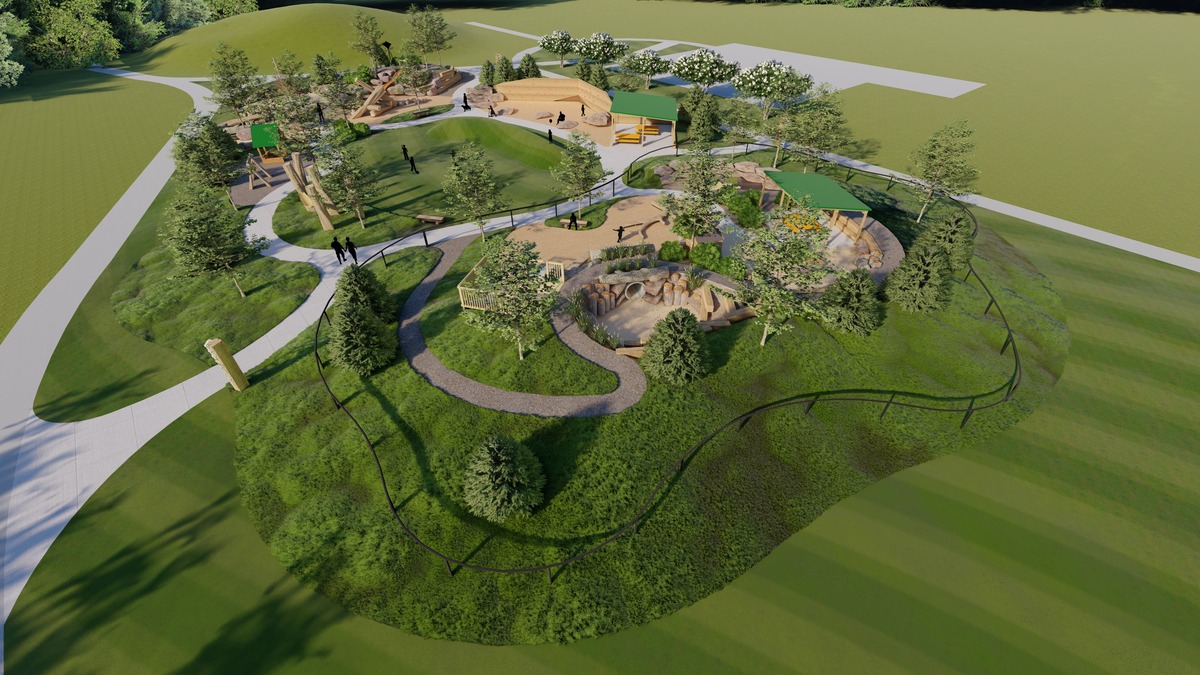 One way we can engage our community in sustainable practices is through the creation of nature-based play, active learning, and resource conservation. Window on the Waterfront Nature Play Park, designed and developed with ODC Network, is a wonderful example of sustainability, incorporating a nature-based playground within an existing community space. Primarily constructed of natural materials and native plants, the park will feature natural play areas and green space in lieu of traditional playground equipment. This strategy reduces embodied energy, promotes water conservation, gives students a natural backdrop for discovery, and contributes to the natural habitat. Children and adults alike will enjoy this natural setting as it contributes to the beautiful surrounding
One way we can engage our community in sustainable practices is through the creation of nature-based play, active learning, and resource conservation. Window on the Waterfront Nature Play Park, designed and developed with ODC Network, is a wonderful example of sustainability, incorporating a nature-based playground within an existing community space. Primarily constructed of natural materials and native plants, the park will feature natural play areas and green space in lieu of traditional playground equipment. This strategy reduces embodied energy, promotes water conservation, gives students a natural backdrop for discovery, and contributes to the natural habitat. Children and adults alike will enjoy this natural setting as it contributes to the beautiful surrounding
SolisMatica LLC, a Holland-based business, was founded with the core value of taking new adventures—to peer into the future with cutting-edge data technology. We are also passionate about wind, solar, and water technologies. The result is constant action to make the world a better place, to buy the client freedom with their time, and to make a positive impact on others.
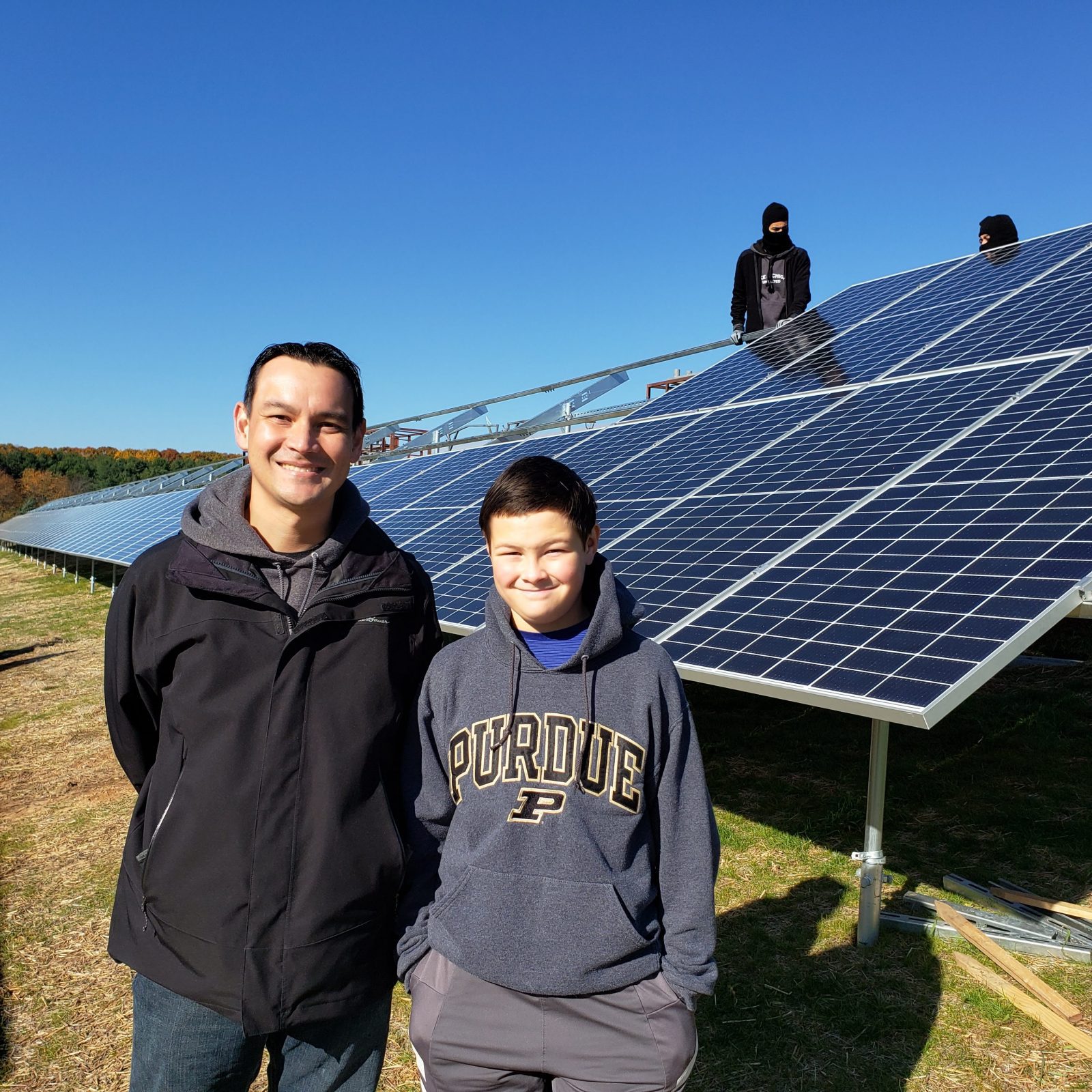 Do you want to take this journey, to write your own story and to take action to combine technology to improve our environment? It is all possible, with advances in Artificial, Business and Edge Intelligence. Couple that with the “Internet of Things” devices and you have a recipe for lower cost products and instant insights into your data to make better decisions.
Do you want to take this journey, to write your own story and to take action to combine technology to improve our environment? It is all possible, with advances in Artificial, Business and Edge Intelligence. Couple that with the “Internet of Things” devices and you have a recipe for lower cost products and instant insights into your data to make better decisions.
What are some examples? Imagine heat maps showing water usage by month and lot size. Visualize air or water quality data over hours in a day to identify sources of pollution. Analyze thermal imaging data to identify broken solar panels in large arrays. We have even partnered with Energy Conservation Source, a local commercial solar panel installer to mine real data in the field.
Interfaceh₂o provides forward-thinking solutions for stormwater management. We’re a problem-solving company, working to turn STORMWATER from a LIABILITY to an ASSET in communities throughout Michigan.
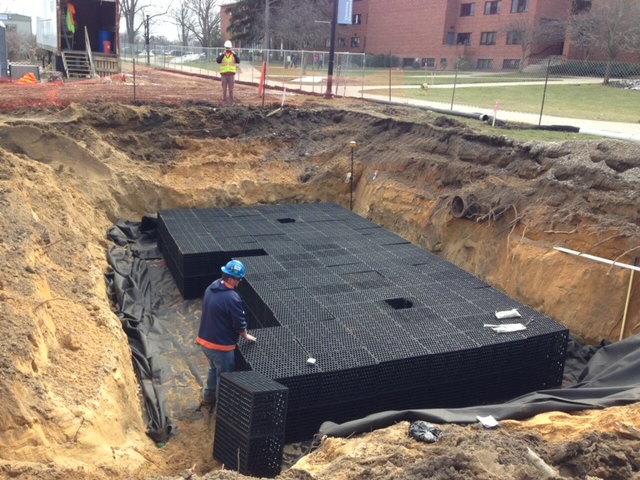 Interfaceh2o’s honest counsel can help find resource-focused solutions to water quality and stormwater management issues that add value to sites and meet regulatory requirements. These include green infrastructure solutions, where stormwater is reabsorbed back into the soil, infiltrated and ultimately replenish aquifers and flow back into streams, rivers and lakes. We work with clients to find innovative stormwater designs and provide green infrastructure products that filter and store stormwater.
Interfaceh2o’s honest counsel can help find resource-focused solutions to water quality and stormwater management issues that add value to sites and meet regulatory requirements. These include green infrastructure solutions, where stormwater is reabsorbed back into the soil, infiltrated and ultimately replenish aquifers and flow back into streams, rivers and lakes. We work with clients to find innovative stormwater designs and provide green infrastructure products that filter and store stormwater. 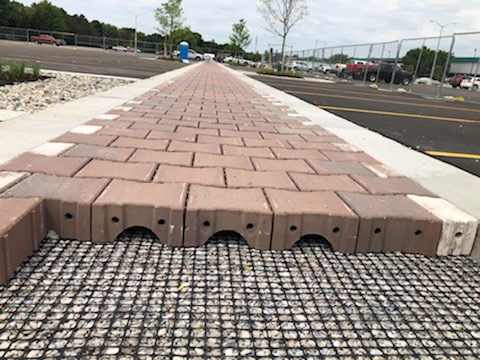 Our high-value stormwater management and water quality efforts do more than address a regulatory requirement—they also provide value to the site or community through a holistic approach that incorporates solutions to flooding, provides open spaces and parks, protects our natural water resources, and consider the aesthetics of the overall project.
Our high-value stormwater management and water quality efforts do more than address a regulatory requirement—they also provide value to the site or community through a holistic approach that incorporates solutions to flooding, provides open spaces and parks, protects our natural water resources, and consider the aesthetics of the overall project.
Community Action House, with three vehicles and many community collaboratives, effectively and efficiently recovers food that grocers or restaurants would otherwise discard due to overstock or near-term expiration dates. Thousands of pounds of food were recovered in the past year providing over 700,000 meals to local families and individuals experiencing food scarcity concerns.
The effort— Food Excess to Access— continues to scale up the amount of perishable food available to other pantries and for individuals in need. All this is ahead of the opening of Community Action House’s new Food Club & Opportunity Hub set to open this fall and serve five times as many guests.
The newest collaboration, with Harvest Stand Ministries, aims to increase perishable and healthy food options for an estimated 10,000 individuals facing food insecurity in the greater Holland/Zeeland area. Reducing duplication of services, Lakeshore Food Rescue is expected to annually provide over 400,000 pounds of food rescued from retailers and farmers in addition to grocer and restaurant recovery efforts.
Black River’s students are encouraged to follow their passions, one such passion led to the establishment of Green Team in 2014. This important student group has led several campaigns in recent years, including sponsoring a school-wide paper recycling contest that recycled almost 5000 pounds of paper. They led the charge in 2019 to teach students what lunchtime items could be recycled and composted. Collected compost was then taken to a local CSA. Green Team was also instrumental in replacing the styrofoam trays with biodegradable trays in the lunchroom. For Earth Day, the group developed teaching materials for use in the classroom and sponsored beach clean up days. At Tulip Time, Green Team member, Hannah Huggett, set up and coordinated the recycling efforts at the race.
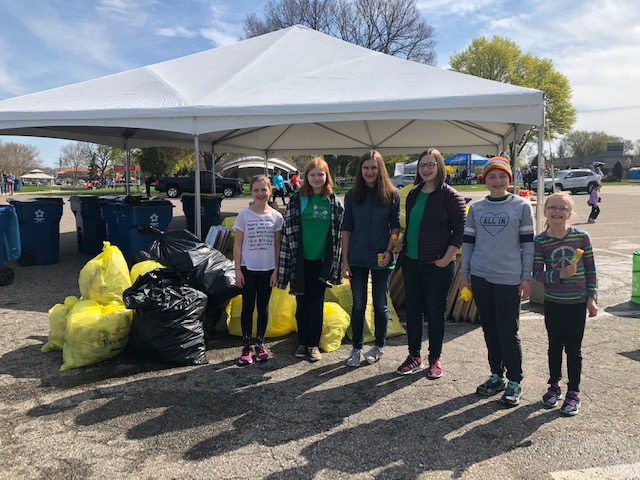 During Project Term 2019, a 4-week May term consisting of hands-on, experiential learning, Black River offered a class that created raised garden beds on campus. With a natural butterfly habitat by the west parking lot as well, students, staff, and parents are able to be involved in maintaining these spaces. Pollinator gardens and butterfly habitats grow in both areas and the raised beds also grow vegetables. Kale, tomatoes, and arugula are growing with the plan of distributing the vegetables to members of the Holland Community. These gardens are incorporated into botany and biology lesson plans from Kindergarten to High School.
During Project Term 2019, a 4-week May term consisting of hands-on, experiential learning, Black River offered a class that created raised garden beds on campus. With a natural butterfly habitat by the west parking lot as well, students, staff, and parents are able to be involved in maintaining these spaces. Pollinator gardens and butterfly habitats grow in both areas and the raised beds also grow vegetables. Kale, tomatoes, and arugula are growing with the plan of distributing the vegetables to members of the Holland Community. These gardens are incorporated into botany and biology lesson plans from Kindergarten to High School.
Sustainability is an ongoing journey at Hope College that includes not only individual and departmental efforts, but the coordinating work of a committee, known as the “Green Team,” consisting of faculty, administrators and students. Activities and practices at the college focused on sustainability have ranged from green purchasing policies; to trayless dining to reduce food waste; to replacing residence halls’ windows with better-insulated models and adding insulation to the cottages’ attics; to annual tree planting celebrations and LEED certified buildings.
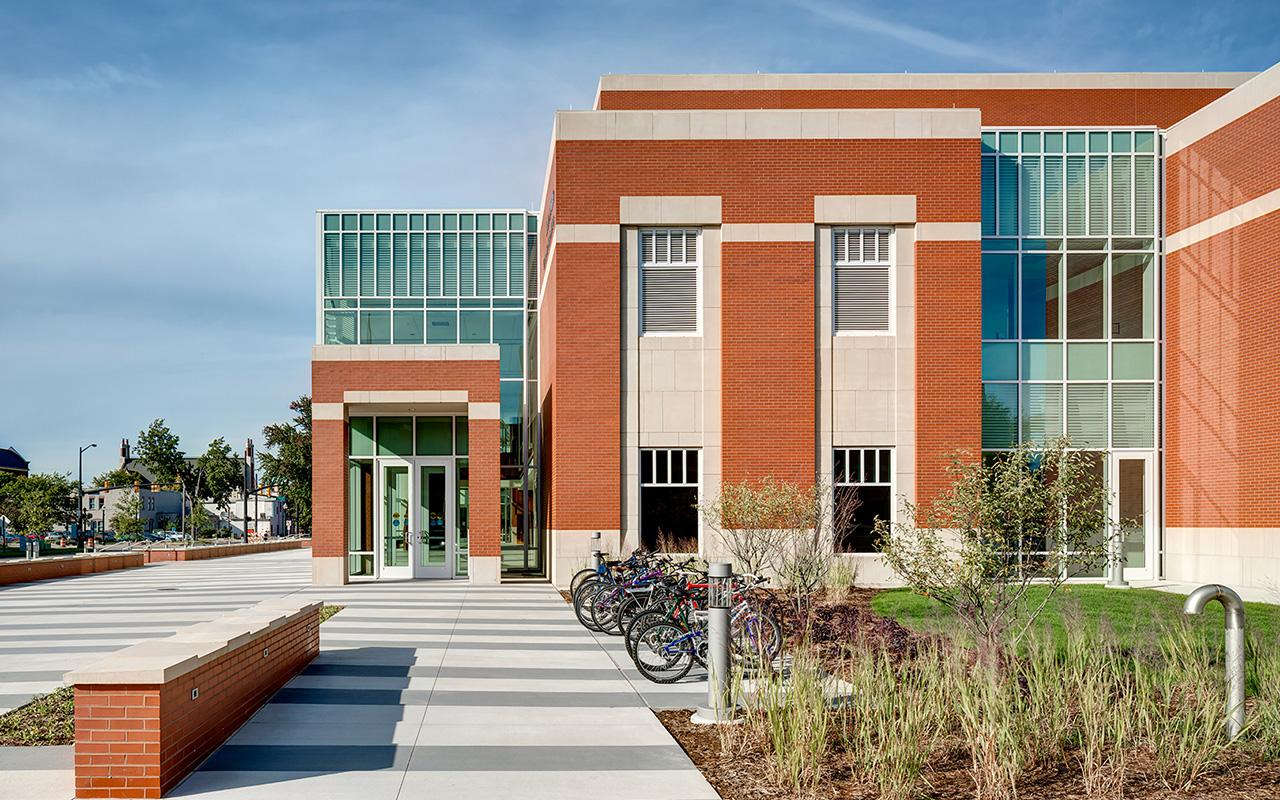 Faculty and student researchers have also been working in partnership with the City of Holland to inventory trees on city property and campus. To date the TreeSap App project has measured nearly 14,000 trees.
Faculty and student researchers have also been working in partnership with the City of Holland to inventory trees on city property and campus. To date the TreeSap App project has measured nearly 14,000 trees.
Hope offers sustainability programs across several departments and has more than 50 individual courses focused on sustainability and another 40 that include sustainability in some way. In addition, multiple faculty-student collaborative research teams pursue environmentally-related projects. Hope has received a variety of awards through the years for its sustainability efforts. Examples include: Sierra Club Cool Schools, Princeton Review Guide to Green Colleges, Association for the Advancement of Sustainability in Higher Education STARS Silver Rating, and Tree Campus USA.
At Lakeshore Habitat for Humanity, sustainability is woven into the fabric of what we do and who we are. Our experience has shown us that affordable, sustainable homes reduce energy consumption, diminishing the energy burden for low-income families. Lakeshore Habitat builds new homes sustainably, using green building techniques and materials that increase the efficiency and durability of the homes and use less resources.
By using these designs, we generate financial savings for our homeowners by lowering their utility costs,which are typically the second greatest monthly expense after mortgage payments. Habitat homes are often more efficient than comparable homes in the community.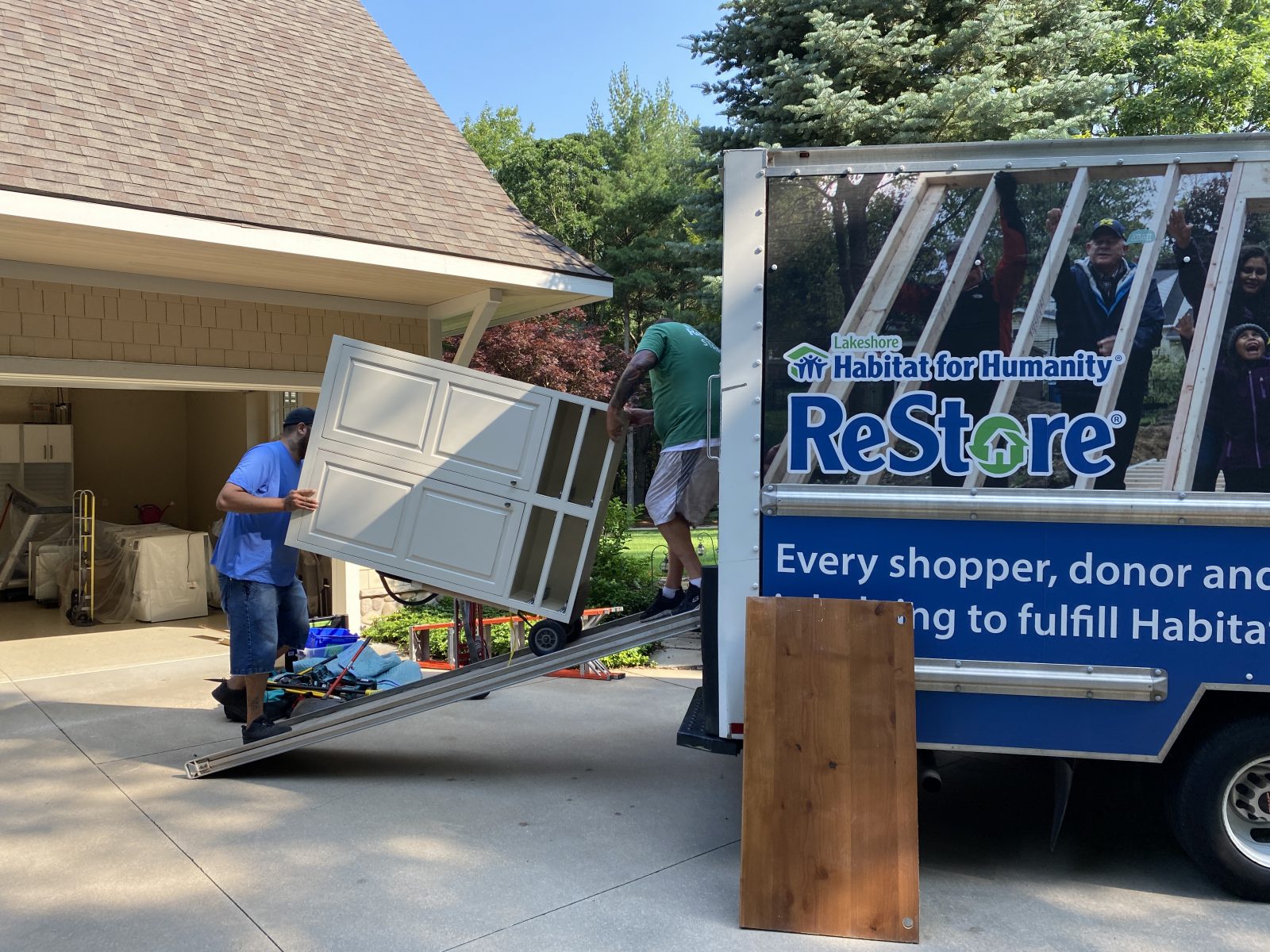
The Holland ReStore, a home improvement store and donation center, gives businesses and individuals an opportunity to donate items they no longer need. In the last ten years we have had over 30,000 items donated to the ReStore which we estimate as 5,967,488 lbs of materials diverted from landfills. One of the featured services of the ReStore is our deconstructions. If you are remodeling, the Holland ReStore will send a team to remove kitchens, baths, and more at no cost. This not only keeps items out of a landfill, but these materials are also recovered and made available through our ReStore.
Ottawa County’s Environmental Sustainability Program has four centers devoted to aiding in living more sustainable. The centers offer numerous collection programs such as residential recycling, electronic waste, scrap metal, scrap tire, used oil/oil filters, food compost, and proper disposal of household hazardous waste. The Environmental Sustainability Program knows that what is done to the environment can and will impact public health and that is why it is so important to consider the end life of materials. The intention of the Environmental Sustainability Program is to provide services that keep usable and harmful material out of the landfill and allowing those items to stay in the use or be properly disposes of. The Environmental Sustainability Centers are open twice a week and one weekend each month to allow for resident’s year-round access to environmental services the centers provide.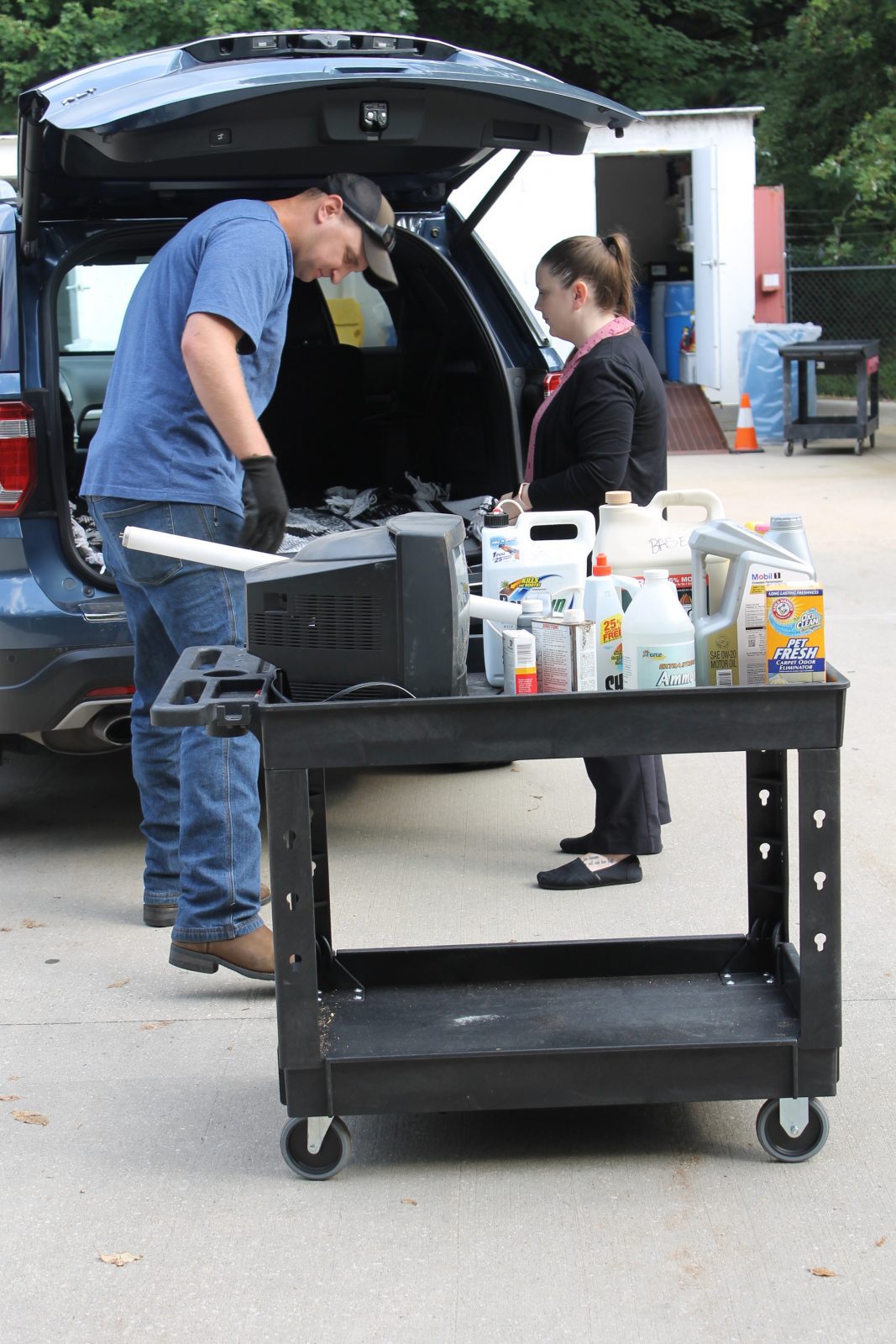
This summer, two new programs have been started, the scrap tire and food compost program. The Scrap Tire Program is available at all four of our sites and our food compost program is available at our Grand Haven and Holland locations currently. If there is an increase interest in the food compost program, then the program will expand to the other to centers. Scrap tire collection is currently have a reduced cost to drop off due to a grant that was awarded by EGLE (Michigan Department of Environment, Great Lakes, and Energy). The Environmental Sustainability Program believes that not only do these two new programs keep valuable materials in use but also aid in keeping the environment and humans healthy.